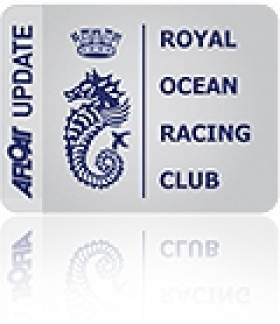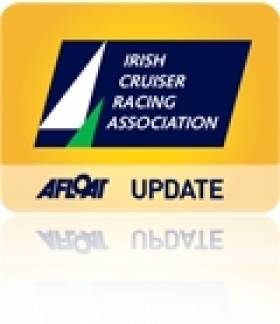Displaying items by tag: Commodores
#commodorescup – Although it sets sail this morning without its defending champions from Ireland the seven international teams are ready for action at the Brewin Dolphin Commodores' Cup that runs until next Saturday at Cowes on the Isle of Wight.
On one of the first days of this summer when crews have been able to wear shorts and sunglasses, the Brewin Dolphin Commodores' Cup fleet is in Cowes Yacht Haven preparing to go racing tomorrow in the Royal Ocean Racing Club's unique international three boat team competition for mostly amateur crews.
Skippers attended a briefing for the Brewin Dolphin Commodores' Cup today at the Royal Yacht Squadron
After an Opening Party at the Royal Yacht Squadron tonight, racing gets underway for the seven three boat teams at 1030 on Sunday with two inshore races. This is followed on Monday by the offshore race, designed to be 24-36 hours long, its scoring weighted by a 2.5x co-efficient.
On Wednesday there is a single inshore race, two more inshore races on Thursday, a Round the Isle of Wight race on the Friday, with a 1.5x co-efficient. A single inshore race rounds off the series on Saturday.
"We have sunshine!" exclaimed Chief Executive of the Royal Ocean Racing Club, Eddie Warden Owen. looking aloft. "All summer we have seen strong winds and this week we are going to have a variety of conditions and that is the most important thing you want in an international competition which is a serious regatta."
The latest forecast indicates that conditions, particularly on Tuesday and Wednesday, will be very light, but building towards the end of the week. But this may not be the case. "Depending on the way the high pressure works we could have good strong sea breezes," says Warden Owen. "If we have a lot of sunshine it could be 18-20 knots - so it is more a high pressure forecast than a light weather one."
However the RORC CEO admits overnight on Monday the racing will be challenging. "But that is part of the fun and it does mean that if there is one very strong team, they know it is going to be very difficult. You can't control the weather and therefore it doesn't matter how good a team you have, you still have to sail well as a group and keep an eye on each other."
Coming from furthest afield, the Hong Kong team has put in the biggest effort to be here. Ante Razmilovic, one of the charterers of the Grand Soleil 43, Quokka 8, in the Hong Kong team, says they have had a slight scrabble to get to the start line after their boat was dismasted two months ago. "The new rig went in about a week ago. It sailed for a couple of days before we took delivery, so we are looking forward to going sailing and not doing boat building!"
Despite being based in Hong Kong, Razmilovic is a highly experienced Solent sailor and agrees with Warden Owen that despite the light forecast they will still get breeze over the course of the week. "The models never show the thermal effects properly so provided it is out of the right direction I'm sure we'll have half of this regatta in 12-18 knots - we'll just see how we go."
Hong Kong is this year fielding one of the strongest teams, this being the third time they have competed having finished runner up to the Irish in 2010.
The French team raised some eyebrows last week after their strong performance in the Cowes-Dinard-St Malo race. "I am very happy to participate here because Cowes is the Mecca of sailboat racing," said Olivier Pesci. "We are proud to represent France in this very high level competition. It is the fifth time we have participated and I think France has won two times - so why not a third?"
As to the light forecast, Hervé Borgoltz thinks the Grand Soleils will be just fine, although their J/122 may suffer slightly.
The Dutch crew on Harmen de Graaf's Baraka GP racing as the 'big boat' in the Benelux team is wishing they had more preparation time. The boat only arrived a few weeks ago and in addition to getting the boat ready they have sailed the Round the Island Race but have otherwise only managed to snatch a few hours of training and none of it in light conditions.
However the crew is experienced. "We have had five hours of sailing with this boat and we feel quite comfortable, but in a year's time we will have another opinion," admits Baraka GP's Dirk de Graaf, eldest son of owner Herman. The whole crew is looking forward to the Ker 40 one design dust-up with sisterships featuring in the Hong Kong, GBR Red and White teams.
One team relishing the light forecast is the British Keelboat Academy racing David Aisher's J/109, Yeoman of Wight, in GBR Black, the smallest, lowest rated boat in the whole Brewin Dolphin Commodores' Cup.
"The lighter airs suits us and we are moded for a light airs event," says the BKA's Luke McCarthy. Lower rated boats tend to perform well in light air - as one observer commented: "It doesn't matter how big you are, everyone drifts at the same speed...."
McCarthy continues: "We are rated with the larger headsails, so that suits us and some of the 40.7s have bigger jibs. I think from a team point of view in GBR Black, we have another small boat in Salvo, so if there is any lighter air park ups in some of the offshore races, it is conceivable that the smaller boat ends up being a little bit more favoured, if there are any lighter air sections in any of the longer races."
In GBR White Nicolas Gaumont-Prat, skipper of Philosophie IV, was also happy with the forecast. "The First 40.7 has always been very competitive and it has a good rating. Normally we are pretty fast in light wind, although we were pretty fast last year when we had some heavy conditions as well. The 40.7 has some overlapping jibs, so although she is a pretty heavy boat she tends to do pretty well in light winds."
While Gaumont-Prat doesn't sound English, he has been based in London for 12 years, is a member of the RORC and has been racing in the UK throughout this time. His crew is a mix of French and English.
Jamie Matheson, Executive Chairman of Brewin Dolphin, was looking forward to the week ahead. "I think everything is set fair. It looks like we are going to get decent weather and nice sea breezes, which is what the sailors want and that will make for a successful regatta. It is good to see the boats here and the whole place looking alive, so I am very encouraged.
"This is our first year of sponsoring the regatta. It is part of a three edition deal that we've done. We are not unfamiliar with sponsoring sailing, but this is a new venture for us and we are very excited about it. It is a different type of regatta from that which we have done in the past, but we are all looking forward to it."
Further details of the Brewin Dolphin Commodores' Cup can be found here.
Crew lists and teams can be found here.
Cruiser Racers Head for Royal Cork
Simon McGibney of WIORA confirmed there are already at least 15 boats interested in travelling to the event to join with the Cork, Kinsale and East coast boats. There is also the tantalising prospect of the fleet being joined by no less than ten quarter tonners from the UK who also plan to sail in the Sovereign's Cup at Kinsale the following week. Most of these British boats are crewed by professionals and will race with the Irish Class three fleet. They will, however, be scored separately and will receive a separate trophy.
Sailing with the Quarter Ton fleet will be Anchor Challenge, beautifully restored and modified by former owner Peter Morton, and now in the ownership of Eamon Rohan. At the weekend our spy spotted an all white gleaming boat wending its way up the Kinsale Road and wondered could this possibly have been Anchor Challenge and, if so, will we see a battle between the all black Tiger and the all white newcomer??
For the duration of the ICRA National Championships there will be subsidised launching at Ringaskiddy for all trailerable boats. In addition a very attractive accommodation package has been arranged for all ICRA competitors at the Carrigaline Court Hotel. They are offering three nights B/B plus one evening dinner from Thursday to Saturday and free B/B for Sunday night at €129 per person sharing.
A crew list has been set up by RCYC for skippers wishing to acquire crews with local knowledge and Race Officers for the event will be the hugely experienced Peter Crowley and Richard Leonard.
ICRA Commodore Barry Rose was delighted to inform the meeting that Yacht Designer Mark Mills has joined the ICRA committee where his expertise and wide knowledge will be greatly appreciated. Mark gave a most interesting report on recent developments re racing matters. One item referred to the fact that boats with bulb keels will now be more severely rated and another item of interest is discussion going on with regard to changing the rating bands for the 2012 Commodores Cup. It is believed there is a move afoot to lower the bands i.e. the current middle rated boat may be the big boat for the 2012 event.































































